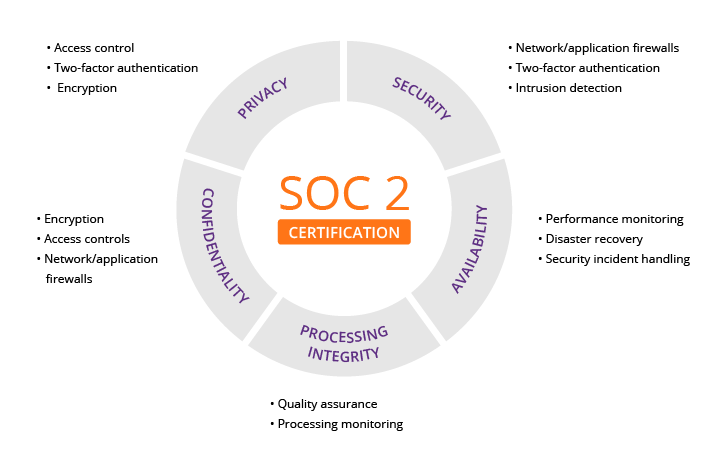SOC 2 Compliance
Information security is a reason for concern for all organizations, including those that outsource key business operation to third-party vendors (e.g., SaaS, cloud-computing providers). Rightfully so, since mishandled data—especially by application and network security providers—can leave enterprises vulnerable to attacks, such as data theft, extortion and malware installation.
SOC 2 is an auditing procedure that ensures your service providers securely manage your data to protect the interests of your organization and the privacy of its clients. For security-conscious businesses, SOC 2 compliance is a minimal requirement when considering a SaaS provider.
What is SOC 2
Developed by the American Institute of CPAs (AICPA), SOC 2 defines criteria for managing customer data based on five “trust service principles”—security, availability, processing integrity, confidentiality and privacy.

Unlike PCI DSS, which has very rigid requirements, SOC 2 reports are unique to each organization. In line with specific business practices, each designs its own controls to comply with one or more of the trust principles.
These internal reports provide you (along with regulators, business partners, suppliers, etc.) with important information about how your service provider manages data.
There are two types of SOC reports:
- Type I describes a vendor’s systems and whether their design is suitable to meet relevant trust principles.
- Type II details the operational effectiveness of those systems.
SOC 2 certification
SOC 2 certification is issued by outside auditors. They assess the extent to which a vendor complies with one or more of the five trust principles based on the systems and processes in place.
Trust principles are broken down as follows:
1. Security
The security principle refers to protection of system resources against unauthorized access. Access controls help prevent potential system abuse, theft or unauthorized removal of data, misuse of software, and improper alteration or disclosure of information.
IT security tools such as network and web application firewalls (WAFs), two factor authentication and intrusion detection are useful in preventing security breaches that can lead to unauthorized access of systems and data.
2. Availability
The availability principle refers to the accessibility of the system, products or services as stipulated by a contract or service level agreement (SLA). As such, the minimum acceptable performance level for system availability is set by both parties.
This principle does not address system functionality and usability, but does involve security-related criteria that may affect availability. Monitoring network performance and availability, site failover and security incident handling are critical in this context.
3. Processing integrity
The processing integrity principle addresses whether or not a system achieves its purpose (i.e., delivers the right data at the right price at the right time). Accordingly, data processing must be complete, valid, accurate, timely and authorized.
However, processing integrity does not necessarily imply data integrity. If data contains errors prior to being input into the system, detecting them is not usually the responsibility of the processing entity. Monitoring of data processing, coupled with quality assurance procedures, can help ensure processing integrity.
4. Confidentiality
Data is considered confidential if its access and disclosure is restricted to a specified set of persons or organizations. Examples may include data intended only for company personnel, as well as business plans, intellectual property, internal price lists and other types of sensitive financial information.
Encryption is an important control for protecting confidentiality during transmission. Network and application firewalls, together with rigorous access controls, can be used to safeguard information being processed or stored on computer systems.
5. Privacy
The privacy principle addresses the system’s collection, use, retention, disclosure and disposal of personal information in conformity with an organization’s privacy notice, as well as with criteria set forth in the AICPA’s generally accepted privacy principles (GAPP).
Personal identifiable information (PII) refers to details that can distinguish an individual (e.g., name, address, Social Security number). Some personal data related to health, race, sexuality and religion is also considered sensitive and generally requires an extra level of protection. Controls must be put in place to protect all PII from unauthorized access.
The importance of SOC 2 compliance
While SOC 2 compliance isn’t a requirement for SaaS and cloud computing vendors, its role in securing your data cannot be overstated.
Imperva undergoes regular audits to ensure the requirements of each of the five trust principles are met and that we remain SOC 2-compliant. Compliance extends to all services we provide, including web application security, DDoS protection, content delivery through our CDN, load balancing and Attack Analytics.
 Firewall Training in India Cyber Security Training & Firewall Training Provider in India
Firewall Training in India Cyber Security Training & Firewall Training Provider in India











